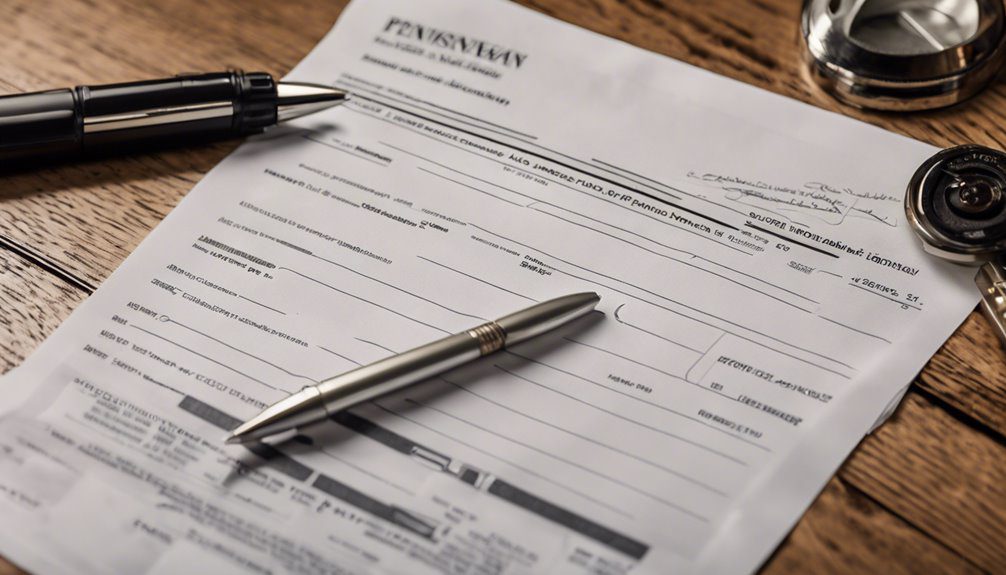If you're considering entering the vehicle salvage business in Pennsylvania, understanding the Motor Vehicle Salvor Service Bond is essential. This bond not only protects the public but also enhances your credibility in a competitive market. You'll need to meet specific eligibility criteria and navigate various costs, which can be quite different depending on your situation. But what happens if you don't comply with these regulations? The implications could be significant, and knowing the full scope of this bond is vital for your success. Let's explore these aspects further.
Understanding the Bond Requirement

When you operate as a motor vehicle salvor in Pennsylvania, understanding the bond requirement is crucial. This bond serves as a financial guarantee that you'll comply with state laws and regulations governing salvage operations.
Essentially, it protects the public and ensures that you're accountable for your actions as a salvor.
To get started, you'll need to obtain a surety bond, which typically requires you to provide personal and financial information to the bonding company. These companies assess your creditworthiness and may ask for collateral to secure the bond. The amount you need to bond can vary, so it's important to check the specific requirements for your operation.
Once you secure the bond, you'll need to file it with the appropriate state agency, usually the Department of Transportation or similar authority. This step is vital for legally conducting salvage operations. Additionally, ensure that you are aware of local regulations regarding compliance with local ordinances, as they may impact your bonding process. Keep in mind that failing to maintain your bond can lead to penalties, including fines or suspension of your salvaging privileges.
Purpose of the Salvor Bond
The purpose of the salvor bond is to ensure financial responsibility and compliance with state regulations in salvage operations. By obtaining this bond, you're demonstrating your commitment to adhere to the laws governing vehicle salvage in Pennsylvania. This not only protects your business but also safeguards the interests of consumers and the public.
When you hold a salvor bond, you're providing a financial guarantee that you'll operate within legal boundaries. If you fail to meet your obligations, the bond acts as a safety net for individuals who might suffer damages due to your actions. This means that if you engage in any unethical practices or violate any regulations, affected parties can make a claim against your bond for compensation.
Additionally, having a salvor bond enhances your credibility in the industry. It shows potential clients and partners that you take your responsibilities seriously. This can lead to increased trust and more business opportunities.
Eligibility Criteria for Applicants

To successfully obtain a motor vehicle salvor service bond in Pennsylvania, you must meet specific eligibility criteria.
First, you need to have a valid Pennsylvania driver's license or an equivalent identification that demonstrates your legal status to operate a business in the state. You should also be at least 18 years old, as this is the minimum age requirement.
Next, you must establish a good credit history. Insurers often evaluate your credit score to determine your reliability and risk level. A higher score can help you secure a bond more easily and at better rates.
Additionally, any past violations or criminal records related to vehicle salvage operations could impact your eligibility. It's essential to have a clean record to show you're trustworthy in this field.
Costs Associated With the Bond
Securing a motor vehicle salvor service bond in Pennsylvania comes with various costs that you should carefully consider. First, you'll need to pay a premium, which is typically a percentage of the bond amount. This percentage can vary based on factors like your credit score and overall financial stability. Generally, the better your credit, the lower your premium may be.
Additionally, there might be administrative fees charged by the bonding agency. These fees can differ among providers, so it's smart to shop around for the best deal. You may also face costs related to obtaining necessary documentation, such as background checks or financial statements, which some agencies require.
Keep in mind that you'll need to maintain the bond for the duration of your business operations. This means budgeting for renewal costs if your bond needs to be renewed annually. It's crucial to understand that specific bond amounts are required for different dealership types, which can impact your total costs.
It's crucial to factor in these ongoing expenses to avoid any surprises down the line. Overall, understanding these costs will help you make informed decisions and ensure you stay compliant with Pennsylvania's regulations for motor vehicle salvage services.
Steps to Obtain the Bond

Obtaining a motor vehicle salvor service bond in Pennsylvania involves several key steps that can streamline the process.
First, you'll need to determine the bond amount required by the state. This amount can vary based on your business needs and the type of services you provide.
Next, you should research and choose a reputable surety bond provider. It's essential to compare rates and understand their terms to ensure you're getting the best deal.
Once you've selected a provider, you'll complete a bond application. This application will typically require you to provide personal and business information.
After submitting your application, the surety company will assess your financial background and creditworthiness. This step helps them determine your eligibility and the premium you'll need to pay.
If approved, you'll receive a bond quote that outlines the total cost.
Once you've agreed to the terms and paid the premium, the surety company will issue your motor vehicle salvor service bond.
Required Documentation
When you're ready to apply for a motor vehicle salvor service bond in Pennsylvania, you'll need to gather specific documentation to ensure a smooth process.
First, you'll want to have your completed application form handy. This form typically requires basic information about your business and operations.
Next, you'll need proof of your business registration. This could be your Articles of Incorporation or a similar document that shows you're legally established.
Additionally, you'll need to provide a copy of your driver's license or personal identification to verify your identity.
You must also submit financial statements that demonstrate your financial stability. These documents can include bank statements or tax returns from the past few years.
Lastly, be prepared to provide any relevant previous bond information or claims history, if applicable.
Collecting these documents ahead of time will help expedite your application and ensure you meet all requirements. By having everything organized, you'll boost your chances of a quick approval for your motor vehicle salvor service bond.
Renewal Process for the Bond

The renewal process for your motor vehicle salvor service bond in Pennsylvania is crucial to maintaining compliance and ensuring uninterrupted operations. To begin, check the expiration date on your current bond; timely renewal can prevent lapses in coverage.
You'll want to initiate the process at least a month before that date to allow for any potential delays. Next, contact your bond provider to discuss the renewal terms. They may require you to provide updated information, such as your business details and financial status.
Be prepared to pay the renewal premium, which might fluctuate based on your previous bond amount and claims history. After you've submitted all necessary documentation and payment, your bond provider will issue a new bond.
Make sure to keep a copy for your records and send a copy to the Pennsylvania Department of Transportation, if required. Lastly, maintain open communication with your bond provider throughout this process. They can offer guidance and help ensure that you meet all state requirements. By staying proactive with your bond renewal, you can keep your operations running smoothly. Additionally, ensure that your bond complies with Illinois Department of Financial and Professional Regulation regulations to avoid any legal issues.
Consequences of Non-Compliance
Failing to comply with the requirements of your motor vehicle salvor service bond can lead to serious repercussions. First and foremost, you risk losing your license to operate as a motor vehicle salvor. This means you won't be able to legally conduct business, which can severely affect your income and reputation.
Additionally, if a claim is filed against your bond due to non-compliance, you could be held financially responsible for damages. This might require you to pay out-of-pocket costs, leading to significant financial strain.
Moreover, your failure to comply can result in fines from the state. These penalties can accumulate quickly, adding to your financial burden and possibly jeopardizing your business's viability. You may also encounter difficulties when trying to secure future bonding or insurance, as a non-compliance record raises red flags for providers.
Lastly, non-compliance can lead to legal actions against you, further complicating your situation. To avoid these consequences, it's crucial to stay informed about your bond requirements and adhere to them diligently.
Keeping up with regulations not only protects you but also maintains your business's integrity.
Benefits of the Bond

Having a motor vehicle salvor service bond offers several valuable benefits that can enhance your business operations and reputation.
First and foremost, it provides a layer of financial protection for your clients. When you're bonded, your customers know they can seek compensation if you fail to meet your obligations. This trust can boost your credibility and attract more clients.
Moreover, having a bond demonstrates your commitment to ethical business practices. It signals to potential customers that you adhere to state regulations and standards, setting you apart from unlicensed competitors. This can lead to increased contracts and partnerships, ultimately growing your business.
Additionally, a motor vehicle salvor service bond can help you access better insurance rates. Insurers often reward businesses that have bonds in place, considering them less risky. You might find that your premiums decrease, allowing you to save money while maintaining comprehensive coverage. Furthermore, contract bonds are essential for businesses participating in contracts requiring surety, which can further enhance your operational capabilities.
Frequently Encountered Challenges
Navigating the complexities of obtaining and maintaining a motor vehicle salvor service bond can present several challenges for business owners.
One major hurdle you might face is understanding the specific bonding requirements mandated by Pennsylvania law. These requirements can vary, and if you're not careful, you might find yourself in a bind—literally.
Another challenge is the financial aspect. Securing a bond often involves a significant upfront cost, which can strain your budget. If your credit score isn't ideal, you may also face higher premiums, making it even tougher to manage your finances.
Additionally, maintaining compliance can be tricky. You need to keep up with any changes in regulations or bonding requirements to avoid penalties. Failing to do so can jeopardize your bond and your business operations. Furthermore, money transmitter bonds serve as financial protection and guarantee for clients, emphasizing the importance of understanding bond requirements to safeguard your business.
Conclusion
In summary, securing a Pennsylvania Motor Vehicle Salvor Service Bond is essential for your salvage business. It not only ensures compliance with state regulations but also enhances your credibility in the industry. By understanding the eligibility criteria, costs, and renewal process, you can navigate the bond acquisition smoothly. Remember, maintaining compliance is crucial to avoid penalties and protect your business's reputation. With the right approach, this bond can be a valuable asset to your operations.


